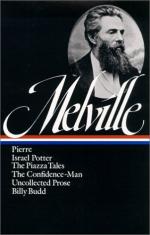Though henceforth elbowed out of many a chance threepenny job by the added thousands who contended with him against starvation, nevertheless, somehow he continued to subsist, as those tough old oaks of the cliffs, which, though hacked at by hail-stones of tempests, and even wantonly maimed by the passing woodman, still, however cramped by rival trees and fettered by rocks, succeed, against all odds, in keeping the vital nerve of the tap-root alive. And even towards the end, in his dismallest December, our veteran could still at intervals feel a momentary warmth in his topmost boughs. In his Moorfields’ garret, over a handful of reignited cinders (which the night before might have warmed some lord), cinders raked up from the streets, he would drive away dolor, by talking with his one only surviving, and now motherless child—the spared Benjamin of his old age—of the far Canaan beyond the sea; rehearsing to the lad those well-remembered adventures among New England hills, and painting scenes of rustling happiness and plenty, in which the lowliest shared. And here, shadowy as it was, was the second alleviation hinted of above.
To these tales of the Fortunate Isles of the Free, recounted by one who had been there, the poor enslaved boy of Moorfields listened, night after night, as to the stories of Sinbad the Sailor. When would his father take him there? “Some day to come, my boy,” would be the hopeful response of an unhoping heart. And “Would God it were to-morrow!” would be the impassioned reply.
In these talks Israel unconsciously sowed the seeds of his eventual return. For with added years, the boy felt added longing to escape his entailed misery, by compassing for his father and himself a voyage to the Promised Land. By his persevering efforts he succeeded at last, against every obstacle, in gaining credit in the right quarter to his extraordinary statements. In short, charitably stretching a technical point, the American Consul finally saw father and son embarked in the Thames for Boston.
It was the year 1826; half a century since Israel, in early manhood, had sailed a prisoner in the Tartar frigate from the same port to which he now was bound. An octogenarian as he recrossed the brine, he showed locks besnowed as its foam. White-haired old Ocean seemed as a brother.
CHAPTER XXVII.
REQUIESCAT IN PACE.
It happened that the ship, gaining her port, was moored to the dock on a Fourth of July; and half an hour after landing, hustled by the riotous crowd near Faneuil Hall, the old man narrowly escaped being run over by a patriotic triumphal car in the procession, flying a broidered banner, inscribed with gilt letters:
“BUNKER-HILL
1775.
GLORY TO THE HEROES THAT FOUGHT!”




